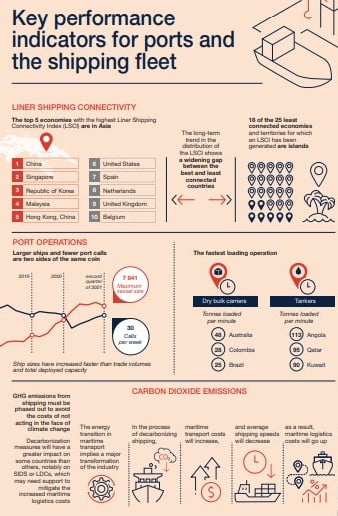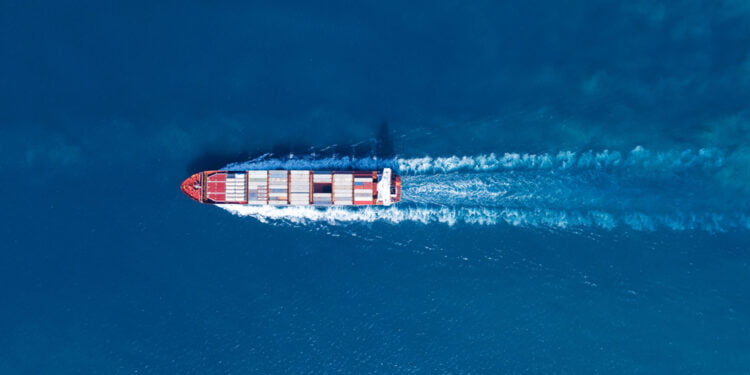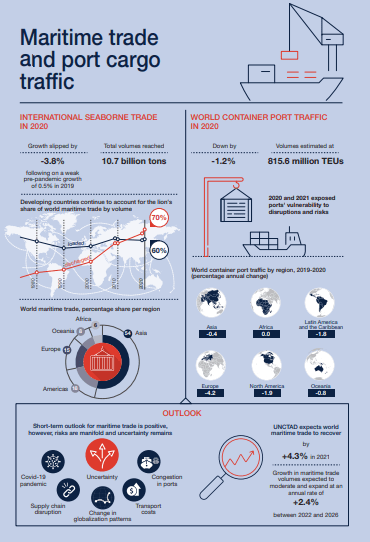The Review of Maritime Transport is an UNCTAD flagship report that provides an analysis of structural and cyclical changes affecting seaborne trade, ports and shipping, as well as an extensive collection of statistics from maritime trade and transport.
First of all, the report sets out 10 priorities for action that the world trade should focus on. These are:
1. Vaccinate the world: To complete broad-based global vaccination, developing countries should have fair access to vaccines. Investing in global vaccination, with the support of dedicated funds, will not just accelerate the end of the pandemic but also stimulate the recovery and add trillions to global economic output.
2. Revitalize the multilateral trade system: Decades of trade liberalization and multilateral action have brought economic and social benefits that are now under threat from increasing trade restrictions and protectionism. To retain these hard-won gains countries will need to defend and consolidate the multilateral trade system and minimize trade restrictiveness.
3. End the crew-change crisis: This requires urgent attention from flag, port and labour-supplying states, in collaboration with relevant international organizations. All states should be parties to the relevant international legal instruments. To advance the objectives of SDG 8, and to ensure decent work for seafarers, states also need to redouble their efforts to ensure that these conventions and labour standards are fully implemented.
4. Vaccinate seafarers: Collaborative efforts by industry, governments and international organizations should ensure that seafarers are designated as key workers and are vaccinated as a matter of priority.
5. Facilitate crew changes: Governments and industry should continue to work together, including through the Neptune Declaration initiative, and in collaboration with relevant international organizations, to facilitate crew changes, in accordance with international standards and in line with public health considerations. They should also ensure the availability and access to related seafarer data.
6. Ensure reliable and efficient maritime transport: Stakeholders in the maritime supply chain, including carriers, ports, inland transport providers and shippers, should work together to ensure that maritime transport remains a reliable, predictable and efficient mode of transport. This will require investing in shipping and ports and their hinterland connections while devising and implementing sustainable freight transport solutions. It will also require proper implementation of trade facilitation measures and digital tools and technologies.
7. Mainstream supply chain resilience, risk assessment and preparedness: This can be achieved through a portfolio of measures, including dual sourcing, redundancy across suppliers, and backing up production sites, inventory, and stocks, along with better risk management, and end-to-end transparency.
8. Control costs: Freight costs can be contained by expanding capacity to match demand, making ports more efficient, improving planning, forecasting and visibility, and implementing trade facilitation measures. The maritime transport market should also be transparent, fair and competitive.
9. Decarbonize: The shipping industry, in cooperation with governments, will need to explore alternative fuels, invest in landside infrastructure and replace older vessels with larger and more fuel-efficient ships. This will require a predictable environment at the global level but in addition, structurally weak developing countries will need help to mitigate transition costs and the lower connectivity that could result from decarbonizing maritime transport.
10. Climate-proof maritime transport: Countries should anticipate, prepare for and adapt to climate change by fully understanding the risks, exposure, and vulnerabilities, and by building adaptive capacity across the maritime supply chain.
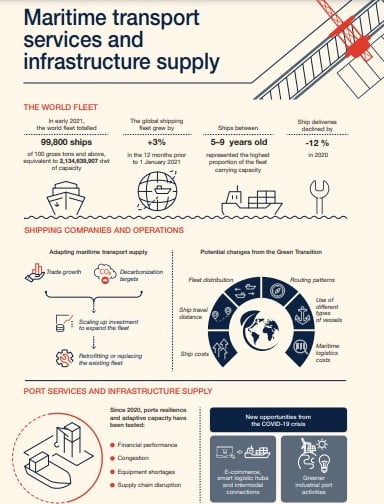
Port perfomance
The report highlighted differences between ports and countries, and showed how these are shaped by human, institutional, and technological factors.
Namely, developing countries generally perform worse, with higher costs and lower connectivity, due to diseconomies of scale, greater distances from overseas markets, and lower levels of digitalization. These and other countries should be aiming for more competitive commercial environments for port and shipping operations, ensuring that external costs are accounted for.
Costs are also likely to increase slightly as a result of measures needed for decarbonization of maritime transport. Smaller and most vulnerable economies may need support to mitigate the increased costs and lower connectivity.
Furthermore, GHG emissions can be reduced by improving port and shipping performance:
If ports can optimize their availability, ships can plan their voyages so as to arrive in port the moment their berth becomes available, thus reducing unnecessary speed and fuel consumption
Maritime transport will also be transformed by the global energy transition which will increase maritime transport costs and reduce average shipping speeds. Logistics costs increases will be greater for developing than for developed countries.
The increase in container rates in the second half of 2020 reflected higher-than-expected demand. As demand continued to surge, even an expansion of capacity was insufficient to constrain prices, because other supply-side factors came into play, including “a global shortage of shipping containers, port congestion, delays, unreliable liner schedules, and increased fees and surcharges.”
Freight rates are expected to remain high – fuelled by continued strong demand against a background of growing supply uncertainty and concerns about the efficiency of transport systems and port operations
Moreover, the upward trajectory in freight rates has also raised questions about market behaviour and transparency in freight pricingm as well as whether that situation has been exacerbated by greater market concentration.
The current surge in freight rates could also have global economic impacts. The UNCTAD simulation suggests that it could increase global import price levels by 10.6%, and consumer price levels by 1.5%. The impact will be even greater in SIDS which could see import prices increase by 24% and consumer prices by 7.5%. In LDCs consumer price levels could increase by 2.2%.
If global trade is to flow more smoothly in future, and ports and maritime transport are to thrive and navigate through the historic disruption caused by the pandemic, this will require actions in some key policy areas, to:
- Monitor markets: To ensure a fair transparent and competitive commercial environment, governments will need to monitor freight rates, as well as fees and charges applied by carriers and port terminals.
- Share information and strengthen collaboration: To enhance transport efficiency and operations there should be greater collaboration and sharing of data between various stakeholders along the maritime supply chain, including carriers, ports, inland transport providers, customs and shippers.
- Analyse trends: Relevant organizations, including UNCTAD, should continue to monitor trends in shipping markets, collect data and deepen their analysis of the structural determinants of transport costs.
- Upgrade ports: To address congestion and ensure efficient and sustainable trade, port operations should be upgraded by improving infrastructure, and investing in new technology and digital solutions. Similar efforts should extend to trade facilitation to improve hinterland connectivity, particular for LDCs, SIDS and LLDCs.
- Move up the value chain: If smaller economies are to be more resilient to external shocks, including freight rate surges and maritime transport disruptions, they should be able to diversify by graduating to higher-value-added products.
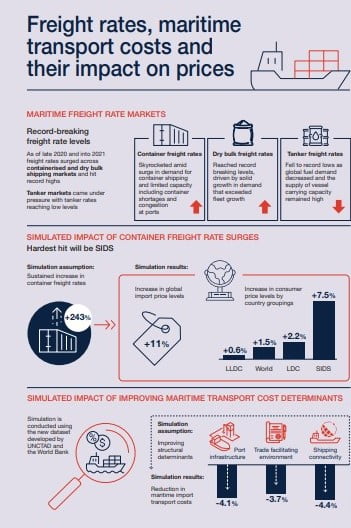
Seafarers
Despite important international support, UNCTAD notes that seafarers are still facing serious problems as a result of the COVID-19 pandemic. This requires urgent action in a number of important areas:
- Vaccination: Collaborative efforts by industry, governments and international organizations should ensure that seafarers are designated as key workers and are vaccinated as a matter of priority.
- Crew changes: Governments and industry should continue to work together, including through the Neptune Declaration initiative, and in collaboration with relevant international organizations, to facilitate crew changes, in accordance with international standards and in line with public health considerations. They should also ensure the availability and access to related seafarer data.
- Route deviations: Charterers and other industry stakeholders should be flexible in accepting requests from shipping companies for route deviation to facilitate crew changes and should refrain from using “no crew change” clauses in charterparties.
- International legal framework: States and other relevant stakeholders should, in consultations and meetings on seafarers’ issues at ILO and IMO, keep under review the relevant legal framework and ensure that international obligations are respected and implemented.
- Maritime single windows: Port community systems should implement the Single Window concept, similarly to the customs-centric Single Window powered by ASYCUDA, to cover all the information and formalities resulting from FAL and other relevant instruments.
- Information exchange: Relevant public and private sector stakeholders should continue their regular exchange of views and best practices on seafarers’ situation and needs, and lessons learned, including from the COVID-19 pandemic, and promote further harmonization and standardization.
- Outbreaks and emergencies at sea: In line with developing scientific insights, governments, international organizations and all stakeholders should regularly update specific guidance on measures to prevent and deal with COVID-19 and other outbreaks at sea and ensure that mechanisms are in place to reduce, and respond to medical emergencies at sea.
Public and private stakeholders must also continue to work together to implement relevant labour standards and address health, safety, security, welfare, and other challenges faced by seafarers.
All should be working to protect seafarers’ human rights and advance the objectives of SDG 8 of decent work and economic growth for sustainable development
UNCTAD concluded.
